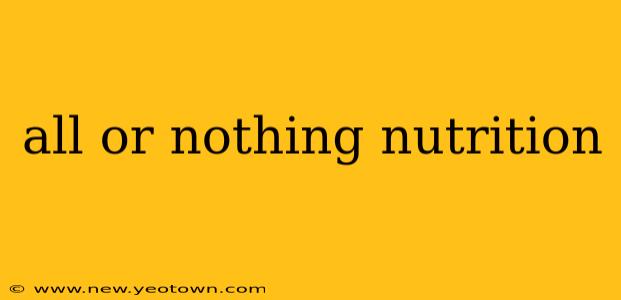We've all been there. The unwavering dedication to a strict diet, followed by a complete meltdown and a return to old habits. This "all or nothing" approach to nutrition is incredibly common, but it's rarely sustainable or effective in the long run. This isn't about guilt or self-flagellation; it's about understanding why this cycle occurs and how to break free, paving the way for a healthier and more balanced relationship with food.
Imagine this: You meticulously plan your meals for a week, meticulously tracking every calorie and macronutrient. You’re feeling great, energized, and proud of your commitment. Then, a birthday party rolls around, and you indulge in a slice of cake. Suddenly, that one slice feels like a monumental failure, derailing your entire week’s progress. You might even think, "Well, I've already messed up, so I might as well go all out." This is the all-or-nothing trap in action.
Why the All-or-Nothing Approach Fails
This cycle stems from a rigid, black-and-white view of nutrition. It lacks flexibility and often prioritizes perfection over progress. Let's explore some key reasons why this approach is ultimately detrimental:
1. It's Unsustainable: Life happens. Social events, stressful days, and travel disrupt even the most meticulously planned diets. When a deviation occurs, the all-or-nothing mentality leads to feelings of failure and a complete abandonment of healthy eating habits. This constant cycle of restriction and indulgence is exhausting and unsustainable in the long run.
2. It Fosters a Negative Relationship with Food: Labelling foods as "good" or "bad" creates a sense of moral judgment around food choices. This can lead to guilt, shame, and anxiety, ultimately hindering a healthy relationship with eating. Instead of viewing food as fuel, it becomes a source of stress and emotional turmoil.
3. It Can Lead to Overeating: The deprivation associated with restrictive diets often leads to intense cravings and overeating. When you finally "break" your diet, the likelihood of consuming excessive amounts of food is significantly higher.
4. It Ignores the Importance of Moderation: Healthy eating is not about complete restriction; it's about finding a balance and making mindful choices. A balanced approach allows for occasional treats without feeling guilty or derailed.
How to Break the All-or-Nothing Cycle
Breaking free from this cycle requires a shift in mindset. Here's how:
1. Embrace Flexibility: Plan for occasional indulgences. Don't see a single deviation as a complete failure. View it as a minor setback in your overall progress.
2. Practice Self-Compassion: Be kind to yourself. Everyone makes mistakes. Don't beat yourself up over occasional slip-ups. Instead, acknowledge them, learn from them, and move on.
3. Focus on Progress, Not Perfection: Celebrate small wins. Acknowledge your achievements, no matter how small they may seem.
4. Find a Sustainable Approach: Focus on creating a long-term lifestyle change, rather than a quick fix. Make gradual, sustainable changes that you can maintain over time.
Frequently Asked Questions (FAQs)
What if I slip up? Does it mean I've failed? No! A single indulgence doesn't negate all your previous healthy choices. Get back on track with your next meal. Focus on your overall eating pattern, not individual instances.
How can I avoid feeling guilty about eating “unhealthy” foods? Reframe your thinking. All foods can fit into a healthy diet in moderation. Instead of labeling foods as "good" or "bad," think of them as "sometimes" and "everyday" foods.
How do I find a balance between healthy eating and enjoying social events? Plan ahead. Choose healthier options at social gatherings, or enjoy a small portion of your favorite treat. Remember moderation is key!
By adopting a more balanced and flexible approach, you can ditch the all-or-nothing mentality and embark on a sustainable journey toward a healthier relationship with food and yourself. It's a journey, not a race. Be patient with yourself, celebrate your progress, and remember that a single slip-up doesn't define your success.

